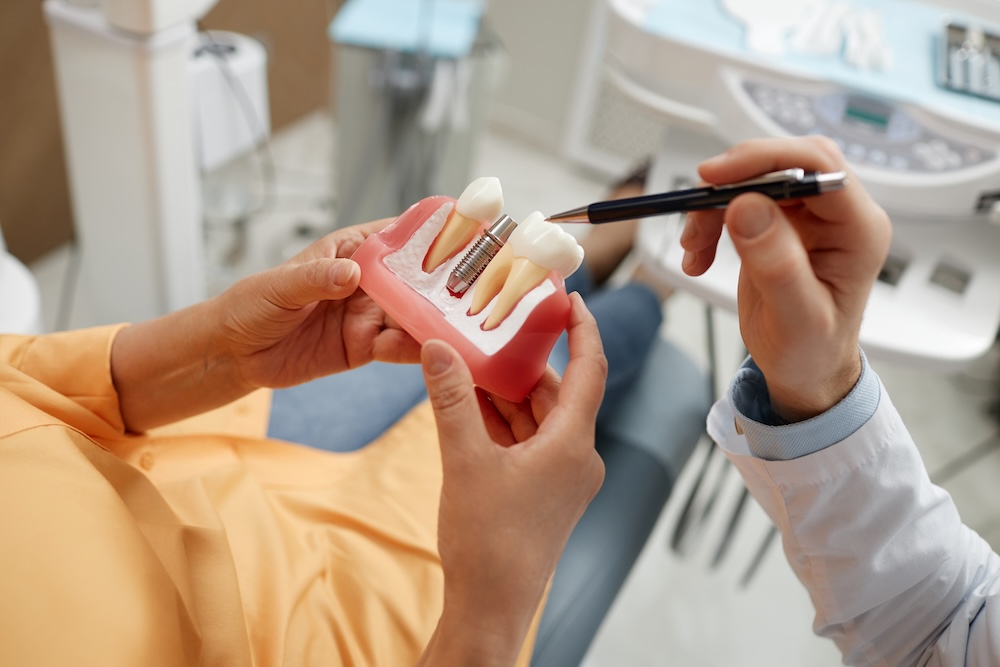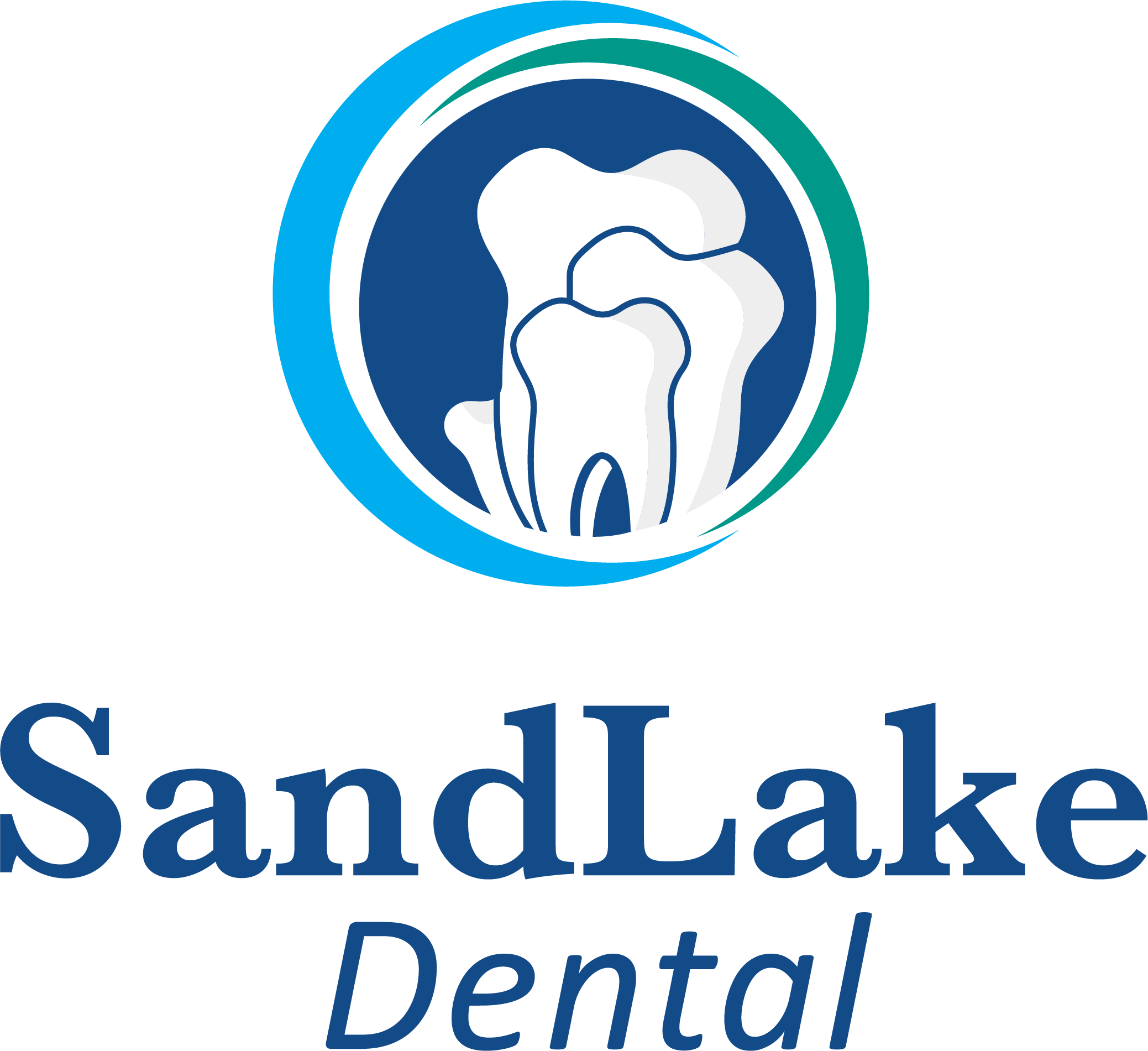
Dental Implants in Orlando

Sand Lake Dental offers dental implants in Orlando that can revolutionize both your smile and your daily life. When tooth loss affects your confidence and ability to enjoy simple pleasures like sharing a laugh or savoring your favorite meals, our advanced dental implants provide a life-changing solution.
We’ve perfected the entire process to create natural-looking, permanent results that seamlessly integrate with your existing teeth. Your journey to a complete, confident smile begins with a solution that’s precisely tailored to your unique needs.
Understanding Dental Implants in Orlando
When a natural tooth is lost, it leaves behind more than just a gap in your smile – it creates a void in your jaw’s living tissue system. This is where dental implants revolutionize tooth replacement by doing what no other solution can. Unlike traditional options that merely fill the visible space, a dental implant actually reestablishes your tooth’s entire root-to-crown structure. The implant itself is a precision-engineered titanium anchor that we place directly into your jawbone’s existing architecture.
But here’s what makes it truly remarkable: your body recognizes and accepts this biocompatible anchor, gradually weaving new bone tissue around it until it becomes as solid as your original tooth root. This integration process turns the implant into a permanent part of your jaw’s foundation, capable of supporting a custom-crafted crown that matches your natural teeth in both strength and appearance.
Components Of A Dental Implant
Implant
The implant is a titanium post that is surgically inserted into the jawbone. It replaces the root of the single missing tooth and becomes fused with your bone over time, providing a stable base for the rest of the implant.
Abutment
The abutment is a connector placed on the dental implant to hold and support the crown. It is a link between the implant and the artificial tooth.
Crown
The crown, also known as the prosthesis, is the part of the implant that looks like a natural tooth. It is usually made of porcelain for the perfect blend of durability and aesthetic appeal, and it is attached to the abutment to provide the functionality and appearance of a natural tooth.
Benefits of Dental Implants

Advantages of Dental Implants
Dental implants offer a myriad of benefits. They are more than just a cosmetic solution; they are a life-changing investment in oral health and overall quality of life. Here are the advantages of dental implants:
Improved Aesthetics And Natural-Looking Results
Dental implants are designed to look like natural teeth. Crafted with attention to detail, they seamlessly blend into your smile, improving its aesthetics and giving you natural-looking results.
Restoration Of Speech And Chewing Function
Missing teeth can significantly affect your speech and ability to chew. Dental implants solve these issues, restoring the standard functionality of your mouth. They enable you to eat your favorite foods without discomfort and speak without impediment.
Preservation Of Facial Structure And Prevention Of Bone Loss
Because of a lack of stimulation, a missing tooth causes the jawbone to deteriorate. Dental implants, including implant-supported dentures, form a bond with the jawbone, stimulating it and promoting bone health. This jawbone preservation helps maintain your facial structure and prevents bone loss.
Enhanced Confidence And Quality Of Life For Patients
Dental implants can dramatically improve your self-esteem and confidence. You’ll feel better in social situations with a radiant smile, enhancing your quality of life. You can smile, laugh, and speak without feeling self-conscious, contributing to overall mental and emotional well-being.
Our Dental Implants Process in Orlando
The procedure typically takes place over several appointments spread across a few months. Here are the general steps, but keep in mind that the specifics can vary depending on your circumstances and our dental professional’s approach:
Mapping Your Smile's Blueprint
We start with high-precision 3D imaging that reveals the unique architecture of your mouth, from bone density patterns to nerve pathways. This detailed analysis helps us identify the optimal positions for your dental implants while spotting potential challenges before they arise. Your evaluation includes testing bite forces and jaw movements to ensure your new implants will function naturally under real-world conditions.
Engineering Your Custom Solution
Using your diagnostic results, we design a precise implant strategy that accounts for your specific bone structure, missing tooth locations, and bite dynamics. We determine factors like implant size, angle, and depth based on careful analysis of your jaw’s load-bearing capacity. For patients needing bone grafting, we create detailed site preparation plans to establish ideal foundational support.
Advanced Precision Placement
The implant placement procedure combines surgical expertise with computer-guided accuracy to position each titanium post for maximum stability. We use advanced monitoring systems to verify precise angulation and depth during placement, ensuring optimal integration with your existing bone tissue. This attention to technical detail helps create a secure foundation for your permanent new teeth.
Biological Integration Period
During this critical phase, your body forms new bone tissue around the implant, creating a permanent bond. We monitor this process using specialized imaging that shows exactly how your bone cells are adapting to the implant surface. Our team provides targeted recommendations for supporting this natural integration process, including specific nutrition and care guidelines that promote optimal healing.
Perfecting Form and Function
Once integration is complete, we focus on creating replacement teeth that match your natural dental anatomy perfectly. Using advanced materials and precise color matching, we craft crowns that blend seamlessly with your smile. Each restoration is carefully adjusted to ensure proper bite alignment and natural function, allowing you to eat, speak, and smile with complete confidence.
Ideal Candidates for Dental Implant Surgery
When it comes to dental implant surgery, not all individuals are suitable candidates. Here is a checklist of the significant factors that determine the ideal candidates for this procedure:
The Dental Implant Recovery Process
The recovery process following dental implant surgery begins with immediate aftercare, during which patients may experience minor bleeding, swelling, and discomfort. These symptoms can be managed with rest and appropriate medication.
During the initial days following surgery, it is recommended that patients rinse their mouths with warm salt water and consume soft foods to facilitate the healing process. Over the subsequent weeks to months, a critical process known as osseointegration occurs, where the implant fuses with the bone. Maintaining good oral hygiene during this period is essential to prevent infections. Regular check-ups with the dentist are also necessary to monitor the healing and osseointegration progress.
Once healing is confirmed, the dentist attaches an abutment to the implant, followed by the final placement of the crown or artificial tooth once the gums have healed around the abutment. Remember that the recovery timeline can vary between individuals, and following our dentist’s instructions while promptly reporting any issues can significantly aid the recovery process.

Long-Term Success and Maintenance
When adequately maintained, dental implants can provide a durable, long-term solution for missing teeth. The longevity of these implants largely hinges on consistent and effective oral hygiene practices.
Regular Brushing And Flossing
Dental implants should be brushed like natural teeth at least twice a day. Flossing should also be part of the daily routine to remove plaque from areas the brush can’t reach.
Special Cleaning Tools
Interdental brushes and water flossers can be particularly effective in cleaning around implants and should be considered part of the oral hygiene arsenal.
Regular Dental Check-Ups
Regular dental check-ups and professional cleanings are essential for maintaining the health and longevity of dental implants. Dentists can detect potential issues early and provide timely treatment.
Avoid Harmful Habits
Smoking or chewing hard foods can damage dental implants. Avoiding these habits can contribute to the long-term success of your implants.
Why Choose Us for Dental Implants
Most dental offices offer implants, but at Sand Lake Dental, we take a fundamentally different approach to tooth replacement. Our team isn’t satisfied with standard solutions – we’ve developed specialized techniques for challenging cases that other practices often decline. Every week, we help patients who’ve been told their bone density was too low or their case was too complex for implant treatment.
By combining advanced bone grafting methods with precise computer-guided placement, we achieve predictable results even in traditionally difficult scenarios. Beyond our technical capabilities, we’ve eliminated the typical barriers that make people hesitate about dental implants – from offering same-day consultations to creating flexible payment options that make treatment accessible to more Orlando residents.
Turn the Page on Tooth Loss With Dental Implants in Orlando!
Stop letting missing teeth limit your life choices. Dental implants can restore more than just your ability to eat and speak – they can give you back the confidence to laugh spontaneously, smile in photos, and say “yes” to social invitations without worrying about your teeth.
Call Sand Lake Dental at (407) 355-0608 today to discover if you’re a candidate for implants, even if you’ve been turned down before.
Book An AppointmentSpecial Offers
Frequently Asked Questions
How long do dental implants last?
Long-term durability is one of the most essential qualities of dental implants. With consistent and proper oral hygiene practices, including flossing, brushing, and regular dental check-ups, dental implants have the potential to last for many years. The longevity of dental implants also depends on other factors, such as the patient’s overall health, lifestyle, and dietary habits.
Does the procedure for dental implants hurt?
Patients should be pain-free during the dental implant procedure, as it is typically conducted under local anesthesia. After the anesthesia wears off, some discomfort or mild pain may be experienced, similar to other dental procedures. However, this can generally be managed effectively with over-the-counter painkillers. Your dentist may also provide specific pain management advice tailored to your situation.
How long does the dental implant treatment take?
The dental implant treatment process is usually not a single-day procedure. It can take several months from the initial consultation to the final placement of the prosthetic tooth or teeth. The process involves various stages, including initial consultations, the surgical placement of the implant, a healing period to allow for osseointegration (where the implant fuses with the jawbone), and finally, the placement of the crown. Some dentists may offer expedited treatment options, often called “teeth in a day,” depending on the patient’s condition.
Are dental implants difficult to care for?
It is relatively easy to care for dental implants. Their maintenance involves the same routine as caring for your natural teeth. Regular brushing twice daily, flossing, and biannual dental check-ups should be part of your dental hygiene routine. It’s also essential to avoid damaging habits like chewing on hard items and smoking, which could compromise the longevity of your implant.
Is bone grafting always necessary for dental implant treatment?
Not all dental implant treatments require bone grafting. It’s typically required when the patient’s jawbone is not sufficiently thick, dense, or healthy enough to support an implant securely. Your dentist will conduct thorough examinations, including X-rays or other imaging techniques, to assess your jawbone’s condition and determine whether bone grafting is needed for successful implant placement.
How is implant-supported restoration differ from dental implants?
Dental implants refer to the titanium posts that serve as artificial tooth roots. Implant-supported restoration is a broader term that includes various restorations, such as crowns, bridges, or dentures, supported and anchored by dental implants. Dental implants provide stability and support for implant-supported restorations, helping to replace missing teeth or support dental structures.
Will my insurance cover dental implants?
Many dental insurance plans now offer partial coverage for dental implants, recognizing them as a standard treatment rather than a cosmetic procedure. The amount covered varies by provider and plan type, with some covering the implant placement while others might cover the crown portion. Our team can help verify your coverage and discuss available financing options to make your implant treatment more affordable.
How soon can I return to work after getting dental implants?
Most patients return to work within 1-2 days after their implant placement, though individual recovery times vary based on the complexity of your case and whether bone grafting was needed. You might experience mild swelling and discomfort, but these symptoms are typically manageable with over-the-counter pain medication. Many patients are surprised by how quickly they can resume their normal daily activities.
What happens if I delay replacing my missing teeth?
Postponing tooth replacement can lead to rapid bone loss in your jaw, potentially causing surrounding natural teeth to shift and creating a domino effect of dental problems. Your facial structure may begin to change as your jawbone density decreases, leading to premature aging and a sunken appearance. The longer you wait, the more complex and costly the implant treatment might become due to potential bone grafting needs.
Can dental implants get cavities?
While dental implants themselves cannot develop cavities, the surrounding natural teeth and gums still require careful attention to prevent infection and ensure long-term success. Regular brushing, flossing, and professional cleanings help maintain both your implants and natural teeth. Poor oral hygiene can lead to complications that might affect your implant’s stability.
What's the difference between single implants and All-on-4?
A single implant replaces one missing tooth with an individual crown, while All-on-4 dental implants use four strategically placed implants to support an entire arch of replacement teeth. The All-on-4 technique provides a full-mouth solution that’s often more cost-effective than replacing multiple teeth with individual implants. Both options provide permanent, stable solutions that look and function like natural teeth.





